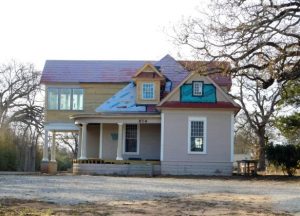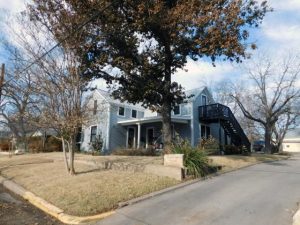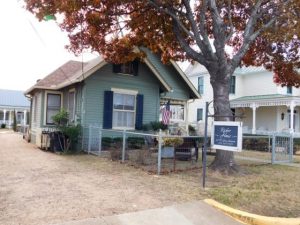By Karly Williams, Standard-Radio Post contributor
Erin Hudson, a real estate investor and former chiropractor, says she found her financial calling in property investment in South Texas after leaving the world of health care. Part of that investment has been near Fredericksburg, where real estate prices and short-term rentals are hotly debated topics.
“For every dollar (earned as a doctor), 50% of that went to Uncle Sam. Now, I give 10% to him,” Hudson said of her real estate portfolio.
Starting with single-family investments, Hudson eventually entered the short-term rental market. In 2022, she opened The Container Retreat at Canyon Lake near San Antonio and The Container Retreat at 290 Wine Trail in Hye, Texas, just east of Fredericksburg.
Hudson said she deliberately chose to invest in Hye due to Fredericksburg’s growing criticisms and ordinance revisions related to short-term rentals, also known as STRs in the real estate world.
“Where we bought, it’s in unrestricted land. We’re not hit with that toughness,” Hudson said, noting that despite more investor freedom outside of Fredericksburg, she’s still received pushback from neighboring property owners. “They’re not excited because we’re encroaching on their land, but some have been nicer than others.”
Hudson isn’t the only one to cash in on the STR market near Fredericksburg, as developments continue to proliferate in a post-COVID world.
Kim Erwin, now a Corpus Christi-based realtor, is originally from Fredericksburg. With a team of other real estate professionals, she’s turning a historical property at 614 Washington St. — dubbed Chateau A Vin Chambreat — into a bed and breakfast.
But Erwin plans to keep her investment as close to the community as possible, stocking it with locally made products and keeping design integrity. As a seasoned realtor, she has her own views on STRs, most of which in Fredericksburg are located along Main Street and its feeder roads.
“They’re held to much lower standards than even hotels,” Erwin said, noting such properties impact nearby non-rental evaluations.
Amid a nationwide housing shortage, she and other Fredericksburg locals are concerned the city simply isn’t doing enough to curb what they describe as the inflationary effect of STRs — which made up 17% of local properties in March according to U.S. Census data — in the tourism-fueled town that relies on bachelorette parties, wineries and day trippers to fuel much of its economy.
Housing concerns remain despite an ordinance rewrite
In April 2022, Fredericksburg’s Adopted Ordinance for Short Term Rentals became effective after new city leaders ushered in a refreshed local government.
The City of Fredericksburg defines a short-term rental as a privately owned dwelling, including but not limited to, a single-family dwelling, multiple-family attached dwelling, apartment house, condominium, duplex, mobile home, or any portion of such dwellings, rented by the public for consideration, and used for dwelling, lodging or sleeping purposes for any period less than 30 days.
Of 5,500 residential lots in the city, about 24 percent were established as current or potential “on the books” STR properties in October of 2022.
The rewritten ordinance classified five separate types of STRs and their zoning restrictions, permit requirements, off-street parking allowances and a hotel occupancy tax requirement of seven percent.
“What’s in danger is the people who work here,” Fredericksburg Mayor Jeryl Hoover said on the impact of increasing housing prices, which many contribute in part to STRs.
Hoover retook political office in early 2022 from former mayor and real estate broker Charlie Kiehne.
Having served as mayor from 2006 to 2010 and 2012 to 2014, he’s no stranger to the Hill Country’s mixed feelings on STRs.
“But, I am a huge believer in market forces. I believe the market generally takes care of imbalances. And anybody looking at the current economic conditions can see we’re in for a terrible coming time.”
Though many residents see the city’s progress as fruitful when compared to the previous administration, housing experts and residents say more needs to be done by the city, despite indicators of a coming recession that could correct some pricing woes.
The STR impact on the housing shortage
Vince Michel was hired by the city of Fredericksburg as the city’s first ever housing coordinator in February to assess the affordable housing market in Fredericksburg.
Nine months into his one-year consultant engagement, he’s extremely vocal about the unsustainable housing market. Still, he doesn’t attribute ballooning prices fully to STRs.
“Instead of post-war starter homes, they’ve been rebranded for STRs. They’re being valued at their cash flow potential,” Michel said on smaller homes in the area. “But Fredericksburg would still have issues with affordable housing even if there were no STRs — but the market is oversaturated.”
In his 29-page affordable housing study published in March that pinned the average home price in the city at over $550,000, he equated Fredericksburg housing prices to resort communities in California and Colorado.
With home prices in the area growing 83% between 2015 and 2021, Michel called the city a “victim of its own success,” especially in a period of time that allowed those with disposable income to enjoy the fruits of the city, away from big city lockdowns and COVID-19 precautions.
Still, he noted housing has historically been difficult to develop in the area due to the limited amount of land that has been rising in price since 2013, when the city began allowing non-owner occupied STRs in the area, allowing investors who don’t maintain residence in the city to buy up single family homes to convert to rentals.
Continuing to lose a foothold for workers
“Fredericksburg imports workers that don’t live there. With the cost of living, the city is pricing them out,” Michel continued.
As he argued, affordability has been an issue long before COVID-19.
In the early 2000s, an employee survey conducted by Hill Country Memorial Hospital revealed that even then, staff had difficulty finding acceptable housing at a reasonable price.
In a sponsored study by the Economic Development commission that followed, the conclusion was made that there were no practical market means at the time to accomplish the radical scale of new affordable housing the area needed — for workers like police officers, firemen, teachers and health care staff.
It seems little has changed in nearly 20 years.
“We can’t afford to house teachers, nurses or service people. And we don’t know who a lot of our STR neighbors even are,” said Bill Snyder, a Center Street resident and member of The Neighborhood Coalition, an organization that aims to protect neighbors from the negative impacts of STRs, including noise. residential disturbances and inflationary housing prices.
His daughter, raised in Fredericksburg, owns a floral design shop on Main Street.
Despite being a successful small business owner, Snyder said she cannot afford to live in the city limits.
A struggle for solutions
Randy Briley is President of the STR Alliance, a group that advocates in the city on behalf of STR owners and supporters, primarily in the real estate community.
Behind his home, he owns and rents out an 1880s North Carolina cabin on North Crockett Street that was deconstructed on the East Coast and brought to Texas.
“If we’re going to make changes, let’s wait and see until we have solid data. Tourists’ dollars are extremely important,” Briley said. “We don’t have data to prove that out-of-town investors are the problem.”
He argued that Granicus LLC — a Denver-based software company that the city has contracted with to provide STR data, monitoring and permitting — has not produced substantial information to support that non-resident investors are the main problem in the STR arena.
Others also maintain qualms with the multi-billion-dollar tech firm, even if they don’t agree with Briley’s premise.
“Granicus sold us on abilities they didn’t have. You don’t need data to show we have a problem,” said Mike Mahoney, a retired attorney and organizer at The Neighborhood Coalition.
An uphill battle
Other residents have also cited the lack of young families and children and flat enrollment in the area’s public schools as a red flag in the housing market.
“There’s going to be some correction, but I can’t tell you if they’re going to bring them back as single families,” said Michel.
He noted there’s been a “whole laundry list” of proposed housing developments, but most were conceived years ago when interest rates rested at around three percent.
Briley is more optimistic for the coming housing stock.
“In nine to 10 years there will be an inventory of 13,000 houses that will be approved,” he said.
But affordable housing has already hit some roadblocks in city debates, showing that possible inventory could fail to come to fruition.
In September of 2022, over 20 residents on Sunday Circle and Mariposa Drive voiced their opposition to a 249-unit apartment development proposed to be built immediately adjacent to the south side of Heritage Hill Country.
At a Fredericksburg City Council meeting, residents cited road hazards as a primary concern, with others arguing the complex would devalue neighboring properties.
It’s just one example of the harsh truth of making new housing developments a reality.
Moving forward, Michel sees greater intervention as the only path forward.
“This community always looked to the private sector to provide; now, they’re having to intervene in that process,” he said.
As a resident, Snyder is also adamant that the city must regain balance.
“What happens to a town when it’s only tourism? It gets cheesy,” he said.
It also gets pricey, as Fredericksburg citizens facing higher property taxes and prospective residents facing bloated prices have confirmed.






